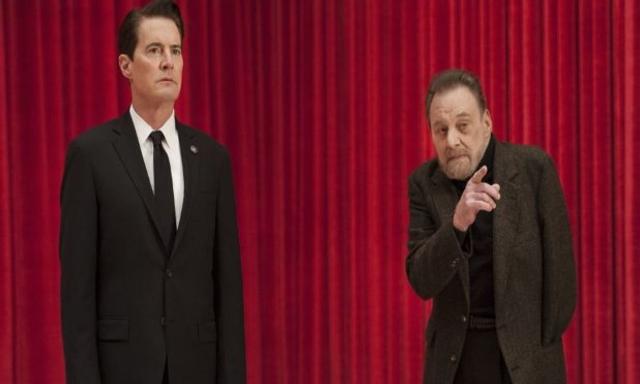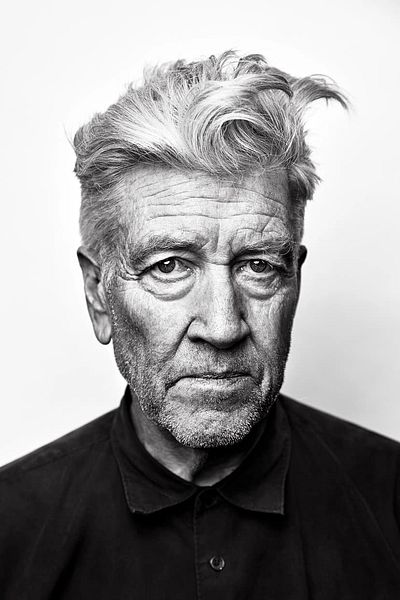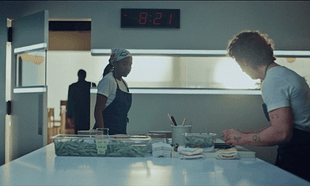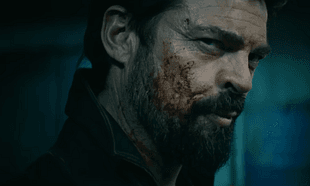It might seem laboured or hackneyed to say it, but there really is no TV show quite like Twin Peaks.
Beginning in 1990, David Lynch and Mark Frost brought forth some of the most original and unsettling television and, twenty-five years on, time hasn't dented their vision. If anything, Lynch and Frost seem emboldened by the intervening years.
It's impossible to recap the opening two-part episode in any kind of way because when you give voice to what you've seen, it makes absolutely no sense whatsoever. You might as well be trying to describe some kind of fever dream, but you know that it felt real and it left a profound impact. There's moments in the episode that hint at what's to come and what has been, but there's a real sense that Lynch isn't so much concerned with the show's legacy as he is with forging a new path for it.
In a lot of ways, Twin Peaks feels less like a sequel for Twin Peaks and is instead like a sequel for David Lynch's entire filmography. Some scenes feel like they could have been plucked from Eraserhead, others have Blue Velvet's twisted sexual undertones, others have INLAND EMPIRE's sense of time and otherness and themes from the likes of Mulholland Drive and Lost Highway are explored and examined. Showtime's CEO, David Nevins, described the series as the "pure heroin vision of David Lynch", and that's exactly what the revival of Twin Peaks is - pure, unadulterated, unfettered Lynch.
From the opening scenes, we're gradually reintroduced to characters - Ben Horne, Laura Palmer, BOB and MIKE, Sheriff Hawk, Dale Cooper - but without any kind of context or reference to the time that's passed. We're simply expected to pick up the story of where they all are in the hope that it'll be explained in later episodes. Of course, trying to attach meaning or find clarity in anything David Lynch has done is like trying to clutch at smoke. It's ultimately self-defeating; you have to simply let the experience of it all wash over you.
That's really what Twin Peaks is - an experience unlike any other. People talk about how Twin Peaks blurred the lines between film and television and it's true, it did. However, what Twin Peaks also did - and continues to do in the new series - is be completely its own thing. It's not like any other film, nor is it like any other TV show. It's Twin Peaks. There are moments in the two-parter that seem to stretch out and be about nothing, but that's exactly the way Lynch wants it to be. He wants you to stare at it, blankly, hoping for meaning and getting nothing in return because things don't always have to have meaning. Meaninglessness can be its own thing, and that's something that Lynch has touched on in previous works and is doing so again in Twin Peaks.
Kyle MacLachlan, returning as Dale Cooper and playing a dual role as well, gives completely of himself in the role. While we don't see anything of the Coop we knew and loved - at least not in the opening episode - MacLachlan is nevertheless present and committed to whatever it is Lynch is driving at. The duality of his performance makes for some unsettling moments, again duality being another recurring theme in Lynch's work - particularly Mulholland Drive. The few other characters who turn up are largely as they were in the original series, still as quirky as ever.
Lynch's direction and use of music, editing and effects is all as it ever was and adds to the unsettling and dreamlike atmosphere of it all. There's only a handful of directors working who still so rigidly keep to their own artistic vision the way he does, and are so uncompromising with it. You either accept the weirdness and go with it, or you reject it entirely - that's what Twin Peaks, and all of Lynch's work, is about.
With that in mind, Twin Peaks is everything you could have hoped for in a revival series. The same sense of wonder and surrealism is there, the vision and weirdness is there, and really, Lynch is throwing everything at it because he's reached a stage in his career where he does't need to worry about expectation or critical appraisal. He's doing his own thing now, and we're all along for the ride.




















































































